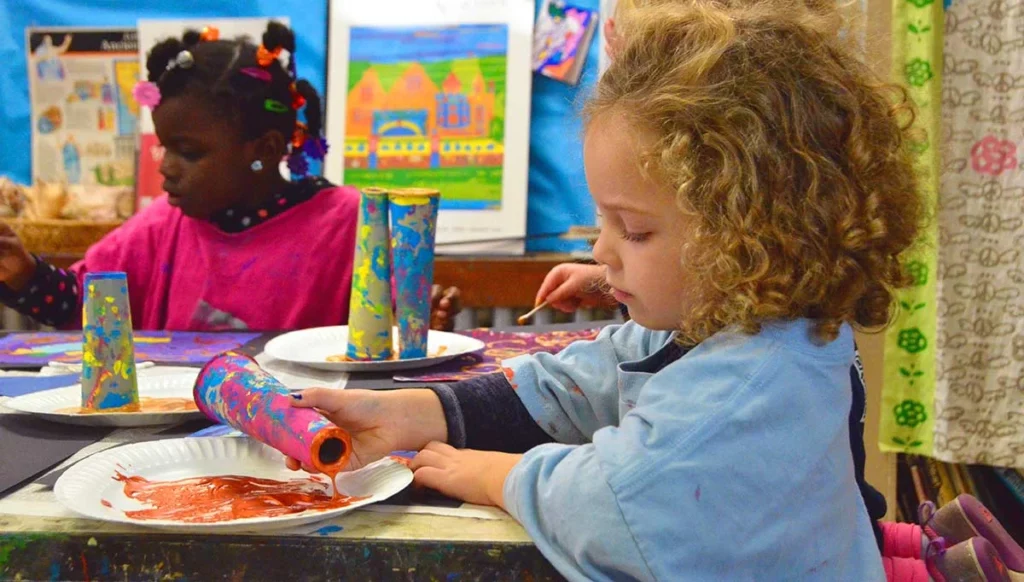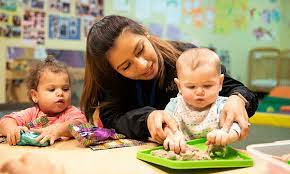Choosing the right nursery school for your child is a significant decision that can shape their early years of learning and development. It’s a place where they’ll take their first steps in education, so it’s crucial to ensure it’s a positive and enriching experience. To help you make an informed choice, we’ve put together a comprehensive guide on what to look for in a quality nursery school.
1. Accreditation and Certification
Start your search by looking for nursery schools that are accredited and certified by relevant education authorities. Accreditation is a sign that the school meets specific standards of quality and safety. These standards often include teacher qualifications, safety protocols, and curriculum quality.
2. Experienced and Caring Staff
The quality of the nursery and preschools school’s staff is paramount. Look for a school with experienced, trained, and compassionate teachers and caregivers. These educators play a vital role in your child’s development and early education.
3. Appropriate Curriculum
Check the school’s curriculum to ensure it aligns with your educational philosophy and goals for your child. A well-rounded curriculum for kids should include activities that promote social, emotional, physical, and cognitive development.
4. Safe and Stimulating Environment
Safety is a top priority. The nursery school should maintain a clean, child-friendly environment with secure access and age-appropriate equipment. Look for stimulating classrooms and facilities that encourage exploration and creativity.
5. Adequate Teacher-Student Ratio
A low teacher-to-student ratio ensures that your child receives individualised attention and care. This teaching style is especially important in the early years when children are learning at different paces.
6. Nutritious Meals and Snacks
If the nursery school offers meals and snacks, inquire about the quality of the food. A balanced and nutritious diet is crucial for your child’s growth and development.
7. Effective Communication
Quality nursery schools maintain open and consistent communication with parents. This includes regular updates on the school communicate your child’s progress, daily activities, and any concerns or milestones.
8. Positive Parent Involvement
An excellent nursery school program encourages parental involvement. This can include opportunities to participate in school activities, attend parent-teacher meetings, and engage in your child’s learning journey.
9. Flexible Scheduling
Consider whether the nursery school offers scheduling options that align with your needs, whether it’s full-time, part-time, or flexible hours.
10. Positive Reviews and Recommendations
Word of mouth is a valuable resource. Talk to other parents, read reviews, and ask for recommendations to gain insights into the nursery school’s reputation and parent satisfaction.
11. Commitment to Inclusivity and Diversity
A high quality preschool or nursery school should embrace diversity and promote an inclusive environment where every child feels valued and respected.
12. Play and Social Interaction
The nursery school should place importance on outdoor play, and social interaction. These activities are essential for a child’s development and the building of essential social skills.
13. Safety Measures and Health Protocols
In light of recent events, it’s important to ensure the nursery school has robust safety measures and health protocols in place, including proper hygiene and illness management procedures.
14. Transparent Policies
The nursery school should have clear and transparent policies on issues like discipline, emergency procedures, and fees.
15. Visit and Ask Questions
Finally, don’t hesitate to visit the nursery school in person, observe, explore the environment, and ask questions. A visit can provide valuable insights into the school’s atmosphere and culture.
The Importance of Your Child’s Early Childhood Education
The early years of a child’s life are a period of astonishing growth and development. During this critical stage, a strong foundation is laid for future learning and cognitive development. Early childhood education plays a pivotal role in nurturing young minds, fostering social and emotional growth, teaching, and preparing children for the educational journey that lies ahead.
1. Social and Emotional Development
Early childhood education provides a structured and supportive environment for which children learn to interact with their peers and teachers. This social interaction helps children develop essential social and emotional skills, such as:
- Empathy: Learning to understand and share the feelings of others.
- Conflict Resolution: Navigating disagreements and finding peaceful solutions.
- Communication: Expressing thoughts, ideas, and emotions effectively.
- Self-Regulation: Managing and controlling their emotions.
2. Cognitive Growth
The early years are a time of incredible brain development. High-quality early childhood education programmes focus on:
- Language Development: Promoting vocabulary growth and communication skills.
- Math and Science: Introducing foundational concepts through play and exploration.
- Critical Thinking: Encouraging curiosity and problem-solving abilities.
3. School Readiness
Early childhood education helps children adjust to a structured learning environment. They become familiar with routines, listening to teachers, and following instructions. These skills are invaluable for a smooth transition into formal education.
4. Long-term Academic Success
Studies show that children who have access to good quality early childhood education tend to perform better academically in later years. The strong foundation built during these early years sets the stage for a lifetime of learning.
5. Language and Literacy Skills
Early childhood education focuses on language and literacy development, which is essential for reading and writing proficiency later on. Children in kindergarten are exposed to books, storytelling, and activities that promote a love for reading.
6. Independence and Confidence
Through age-appropriate tasks and responsibilities, early childhood education helps children gain a sense of independence and self-confidence. This builds a positive self-image that can benefit them throughout life.
7. A Love for Learning
Perhaps most importantly, early childhood education can instil a lifelong love for learning. It introduces children to the joys of discovery and active learning, and helps them view education as an exciting and engaging journey.
Choosing the Right Programme
When selecting an early childhood education programme for your child, consider the following:
- Accreditation: Ensure the programme is accredited and meets quality standards.
- Qualified Staff: Verify that teachers and caregivers are trained in early childhood education.
- A Focus on Play: Play-based learning is essential for young children’s development.
- A Safe and Nurturing Environment: The setting should be secure, supportive, and stimulating.
What Makes a Good Preschool Stand Out from Other Parents
Choosing the right preschool for your child is a crucial decision that sets the stage for their early education and future learning experiences. A good preschool can have a lasting impact on a child’s cognitive, social, and emotional development.
Teachers Interact
Teachers are the heart and soul of the classroom in any educational institution. Their role extends far beyond delivering lessons and imparting knowledge; they play a pivotal part in creating an environment where students can interact, learn, and grow.
Choosing a good nursery or school is a significant step for both you and your child. By considering these factors and conducting thorough research, you can make a well-informed decision and provide your child with a nurturing and enriching early learning experience. Remember that a quality nursery school sets a solid foundation for a lifelong love of learning.



Recent Comments